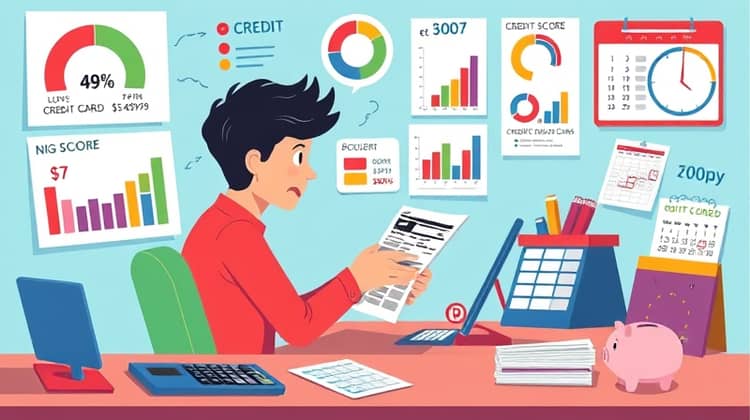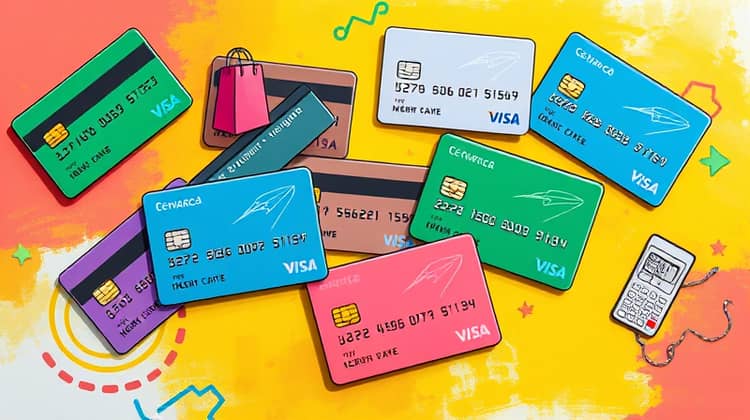Credit cards can be a powerful financial tool when used correctly. However, there's a lot of misinformation out there that can lead to poor financial choices. By clarifying some of the most common credit card myths, you can navigate your credit journey with confidence and clarity. Let's explore these myths and uncover the facts.
- Carrying a balance improves your credit score.
- All credit cards are the same.
- Closing a credit card will improve your score.
- You need to go into debt to have good credit.
- Credit cards are only for emergencies.
Understanding the truth about credit cards can save you a lot of money and improve your financial health. Many people fall victim to common myths surrounding credit card usage, which can adversely affect their credit scores and personal finance decisions. This article aims to debunk these myths, giving you the knowledge needed to use your credit wisely.
1. Carrying a Balance Improves Your Credit Score

One of the most pervasive myths about credit cards is the notion that carrying a balance is beneficial for your credit score. This idea likely comes from a misunderstanding of how credit utilization ratio works. Credit utilization measures the amount of credit you are using compared to your total credit limit, and it comprises a significant portion of your credit score.
In reality, the best practice for maintaining a healthy credit score is to keep your credit utilization below 30%. Carrying a balance usually means you're using a larger portion of your available credit, which can lower your score.
Moreover, accruing interest on a balance can lead to significant long-term costs, which only adds to the misunderstanding about credit management. Paying off your balance in full each month is the ideal strategy to avoid interest and maintain a good score.
- Pay off your balances in full each month.
- Keep your credit utilization below 30%.
- Understand that carrying a balance does not improve your score.
To sum up, it’s clear that maintaining low credit utilization is more beneficial for your credit score than carrying a balance. If you want to improve your credit standing, focus on using your cards responsibly without rolling over debt.
Being diligent about payments and credit management can enhance your financial health in the long run.
Adopting responsible credit card habits will not only maintain but could potentially elevate your credit score over time.
2. All Credit Cards Are the Same

Another misconception is that all credit cards function the same way. While they all offer the basic features of borrowing money with a limit, the types of credit cards available can significantly vary in terms of fees, rewards, interest rates, and benefits.
For instance, some cards are designed for those with limited or poor credit history, while others are aimed at providing substantial rewards or cash back to frequent travelers or shoppers.
Understanding the specific advantages and disadvantages of each type of credit card is crucial in choosing the right one for your financial situation.
3. Closing a Credit Card Will Improve Your Score

Many believe that closing a credit card account will automatically lead to an improved credit score. This is another myth that often misguides individuals in their credit management journey.
In reality, closing a credit card can negatively impact your score because it affects your credit utilization ratio and the length of your credit history. Less available credit could increase your utilization percentage, while shorter credit histories generally unravel the good credit behavior you've built up over time.
- Consider keeping your old accounts open, especially those with a long history.
- Be cautious about closing accounts near big purchases, like applying for a mortgage.
- Regularly monitor your credit report to keep track of how account changes affect your score.
In short, closing a credit card may seem beneficial, but it can lead to varying repercussions on your credit score. A more strategic approach involves evaluating the circumstances surrounding each card before making a decision.
Think twice before acting on the impulse to close cards as it might do more harm than good in the long term.
4. You Need to Go into Debt to Have Good Credit

One common misconception is that accumulating debt is necessary for building good credit. This myth can seem reasonable to those who see credit scores awarded for accounts with lengthy history and active usage.
In actuality, responsible credit use does not mean going into debt. Having a credit card and using it wisely—meaning paying it off regularly and on time without carrying a balance—can help establish and improve your credit without incurring debt.
- Use credit cards responsibly without accumulating debt.
- Make timely payments to enhance your credit profile.
- Limit the amount of credit you use relative to your total credit limit.
5. Credit Cards Are Only for Emergencies

Many people believe that credit cards should only be used for emergencies, which leads to underutilization of this financial tool. It's essential to realize that credit cards can also be beneficial for everyday purchases and managing cash flow.
Using a credit card strategically can actually help you earn rewards, establish better credit history, and maintain control over your finances. The key is to spend within your means and ensure that you can pay off your balance every month.
Addressing this myth can empower you to use credit cards for planned expenses rather than solely relying on them for unexpected situations.
- Utilize credit cards for planned purchases to earn rewards.
- Use your card responsibly to manage cash flow.
- Pay off your balance each month to avoid interest charges.
Overall, having a credit card is not just about emergencies. When used wisely, it can be a functional asset in your financial toolkit. Set a budget, know your spending limits, and enjoy the perks of credit cards.
Managing your credit cards smartly can make them an excellent resource for everyday budgeting and savings.
The Bottom Line

Understanding credit is crucial for anyone looking to maintain a healthy financial profile. Debunking these myths allows consumers to make informed decisions about their credit and finances.
Keep in mind that responsible credit management is key to building a solid credit history. By focusing on facts rather than myths, you can enhance your financial standing and avoid costly mistakes.














